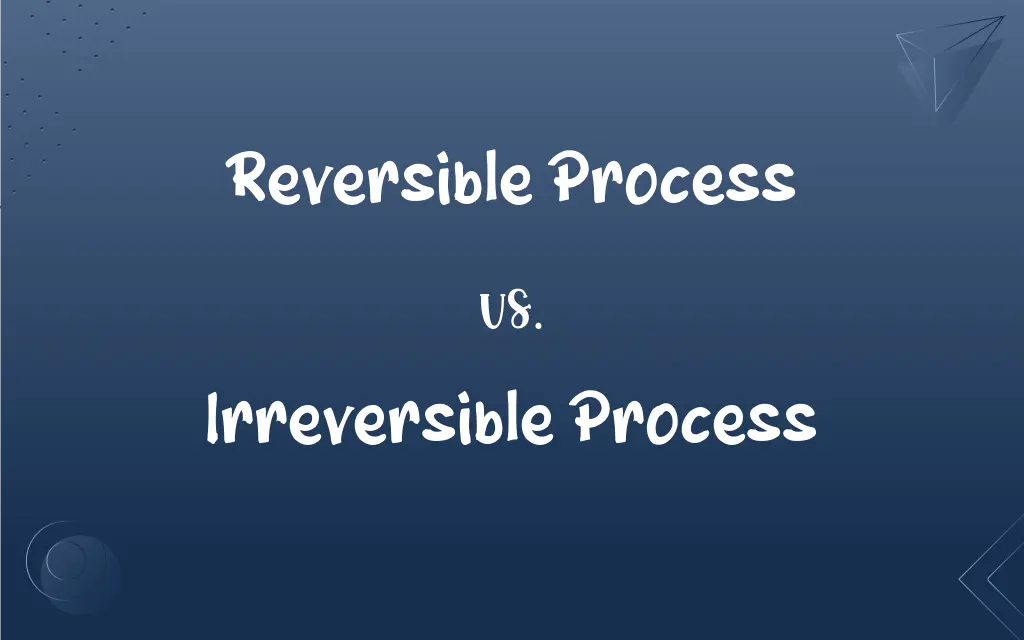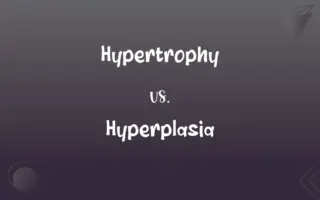Reversible Process vs. Irreversible Process: What's the Difference?
Edited by Aimie Carlson || By Harlon Moss || Updated on October 24, 2023
A reversible process can be reversed without any external influence, while an irreversible process cannot be undone without external changes.

Key Differences
A reversible process in thermodynamics is one where the system and its surroundings can be restored to their initial states without any energy imbalances. In contrast, an irreversible process leaves a system and its surroundings in non-restorable states, with some energy lost to surroundings.
In a reversible process, every state through which the system passes can be exactly retraced in the reverse order, meaning it's an idealized process. The irreversible process, however, involves states that cannot be retraced because of factors like friction or non-equilibrium conditions.
When considering the efficiency of thermodynamic cycles, reversible processes are always more efficient than irreversible processes. This is because there's no entropy generation in a reversible process, but an irreversible process always increases the total entropy of the system and surroundings.
The reversible process is an idealized concept, often used as a benchmark in thermodynamic evaluations. Real-world processes tend to be irreversible because of the presence of uncontrollable variables. The irreversible process, being more realistic, offers practical insights into how systems naturally progress.
From an energy perspective, a reversible process ensures that the maximum work is obtained from a system. An irreversible process, on the other hand, means some of the energy has been wasted, usually in the form of unrecoverable heat due to entropy generation.
ADVERTISEMENT
Comparison Chart
Restoration of Initial States
Can restore the system and surroundings to initial states
Cannot restore the system and surroundings without external changes
Pathway
Every state can be retraced in reverse order
Involves states that cannot be retraced
Efficiency
More efficient as there's no entropy generation
Less efficient due to entropy generation
Realism
An idealized concept, rare in real-world situations
More commonly observed in real-world processes
Energy Perspective
Maximum work is obtained
Some energy is wasted, often as unrecoverable heat
ADVERTISEMENT
Reversible Process and Irreversible Process Definitions
Reversible Process
A reversible process doesn't generate any entropy.
The isothermal expansion of an ideal gas can be considered a reversible process when done infinitely slowly.
Irreversible Process
In an irreversible process, some of the system's energy gets wasted.
Inefficient engines release more waste heat, indicating an irreversible process.
Reversible Process
In a reversible process, the maximum possible work is achieved.
A Carnot engine, operating between two temperature reservoirs, exemplifies a reversible process achieving maximum work.
Irreversible Process
An irreversible process is one where the system can't return to its initial state without external changes.
Mixing milk and coffee results in an irreversible process.
Reversible Process
A reversible process is one where the system returns to its initial state without energy imbalances.
Melting ice and refreezing it under ideal conditions is a reversible process.
Irreversible Process
Irreversible processes are driven by factors like friction, non-equilibrium conditions, or chemical reactions.
Rusting of iron is an irreversible process driven by a chemical reaction.
Reversible Process
Reversible processes are idealized situations in thermodynamics.
In textbooks, a frictionless piston's movement in a cylinder is often described as a reversible process.
Irreversible Process
Irreversible processes always result in an increase in total entropy.
Stirring a liquid generates heat due to friction, marking it as an irreversible process.
Reversible Process
Reversible processes can be retraced exactly in reverse order.
Compressing a spring and then releasing it demonstrates a reversible process if no energy is lost.
Irreversible Process
Real-world processes are mostly irreversible because of uncontrollable variables.
When you light a matchstick, the combustion process is irreversible.
FAQs
What's the fundamental difference between a reversible process and an irreversible process?
A reversible process can be completely reversed without external influence, while an irreversible process cannot.
Are most real-world processes reversible or irreversible?
Most real-world processes are irreversible.
Is entropy change zero in a reversible process?
For the system and surroundings combined, yes.
Is a perfectly elastic collision a reversible process?
Yes, because both energy and momentum are conserved without losses.
Can a reversible process occur naturally?
It's rare because real-world conditions usually introduce some irreversibilities.
What is the significance of entropy in distinguishing between reversible and irreversible processes?
Entropy increases in an irreversible process and remains constant in a reversible one.
Why is a reversible process considered ideal?
Because it doesn't generate entropy and can achieve maximum work.
Is a frictionless scenario a reversible process?
Yes, in a frictionless scenario, the process can be considered reversible.
Can chemical reactions be reversible?
Some can reach equilibrium where reactions proceed in both directions, but many are inherently irreversible.
Can an irreversible process be 100% efficient?
No, irreversible processes always have some energy losses.
Are there any practical uses for reversible processes?
While purely reversible processes are idealized, understanding them helps in designing more efficient real-world systems.
Can irreversible processes be made reversible?
Not truly, but they can be made "more reversible" by minimizing losses.
Does a reversible process have any energy loss?
Ideally, no; a reversible process has no energy imbalances.
Why do irreversible processes increase entropy?
Due to inherent inefficiencies, like friction or chemical reactions.
Why are reversible processes important in thermodynamics?
They offer a benchmark for maximum efficiency and work.
Are all chemical reactions irreversible processes?
No, but many are, especially if they release energy or produce stable products.
What factors can make a process irreversible?
Factors like friction, non-equilibrium conditions, or irreversible chemical reactions.
Why is friction an irreversible process?
Because it generates heat that increases entropy and cannot be fully recovered.
Is the Carnot cycle reversible or irreversible?
The Carnot cycle is an example of a reversible process.
Can you reverse an irreversible process with external help?
Some processes can be driven in the reverse direction with external energy, but they are still fundamentally irreversible.
About Author
Written by
Harlon MossHarlon is a seasoned quality moderator and accomplished content writer for Difference Wiki. An alumnus of the prestigious University of California, he earned his degree in Computer Science. Leveraging his academic background, Harlon brings a meticulous and informed perspective to his work, ensuring content accuracy and excellence.
Edited by
Aimie CarlsonAimie Carlson, holding a master's degree in English literature, is a fervent English language enthusiast. She lends her writing talents to Difference Wiki, a prominent website that specializes in comparisons, offering readers insightful analyses that both captivate and inform.
































































